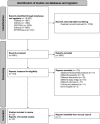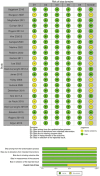Effects of exercise on inflammation in female survivors of nonmetastatic breast cancer: a systematic review and meta-analysis
- PMID: 40112254
- PMCID: PMC12505137
- DOI: 10.1093/jnci/djaf062
Effects of exercise on inflammation in female survivors of nonmetastatic breast cancer: a systematic review and meta-analysis
Abstract
Background: Despite advances in breast cancer treatment, recurrence remains common and contributes to higher mortality risk. Among the potential mechanisms, inflammation plays a key role in recurrence by promoting tumor progression. Exercise provides a wide array of health benefits and may reduce inflammation, potentially reducing mortality risk. However, the effects of exercise, including mode (ie, resistance training [RT], aerobic training [AT], and combined RT and AT) and program duration, on inflammatory biomarkers in breast cancer survivors remain to be elucidated.
Methods: A systematic search was undertaken in PubMed, CINAHL, Embase, SPORTDiscus, and CENTRAL in August 2024. Randomized controlled trials examining the effects of exercise on interleukin-1 beta (IL-1β), interleukin 6 (IL-6), IL-8, IL-10, tumor necrosis factor alpha (TNF-α), and C-reactive protein (CRP) were included. A random-effects meta-analysis was undertaken to quantify the magnitude of change.
Results: Twenty-two studies were included (n = 968). Exercise induced small to large statistically significant reductions in IL-6 (standardized mean difference [SMD] = -0.85; 95% CI = -1.68 to -0.02; P = .05) and TNF-α (SMD = -0.40; 95% CI = -0.81 to 0.01; P = .05) and a trend for a decrease in CRP. When stratifying by exercise mode, trends toward reduction in IL-6 and TNF-α were observed for combined exercise, while changes were not generally affected by exercise program duration.
Conclusion: Exercise, especially combined RT and AT, can reduce pro-inflammatory biomarkers, and may be a suitable strategy to reduce inflammation in breast cancer survivors. However, further research is needed to investigate the effects of exercise mode and program duration on markers of inflammation in this survivor group.
© The Author(s) 2025. Published by Oxford University Press.
Conflict of interest statement
All authors declare that they have no conflicts of interest relevant to the content of this study.
Figures





References
-
- Bray F, Laversanne M, Sung H, et al. Global cancer statistics 2022: GLOBOCAN estimates of incidence and mortality worldwide for 36 cancers in 185 countries. CA Cancer J Clin. 2024;74:229-263. - PubMed
-
- Vendramini-Costa DB, Carvalho JE. Molecular link mechanisms between inflammation and cancer. Curr Pharm Des. 2012;18:3831-3852. - PubMed
Publication types
MeSH terms
Substances
LinkOut - more resources
Full Text Sources
Medical
Research Materials
Miscellaneous

